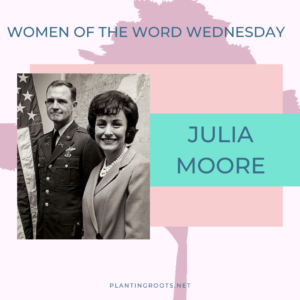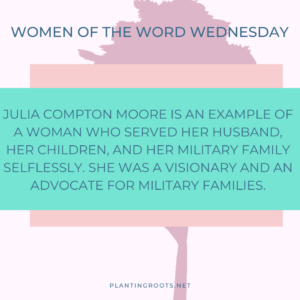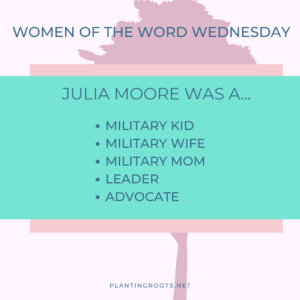Join our Director of Leadership Development, Brenda Pace, as she shares about Julia Compton Moore: Names, Legacy, and Moore.
Julia Compton Moore: Names, Legacy, and Moore
by Brenda Pace
Driving onto the tree-lined Main Post of Ft. Benning, Georgia, was an unexpected pleasure. We had never been on an Army post before, and as my husband’s first duty station, the pristine southern charm of Ft. Benning took us by surprise. We would call this place home twice in my husband’s military career, with each assignment providing warm memories of rich community and personal growth. Simple nostalgia brought mixed emotions about the name change of Ft. Benning to Ft. Moore—until I learned the rest of the story.
New Names
In 2020, Congress mandated the re-designation of nine Army installations named after Confederate officers. The goal was to “inspire today’s Soldiers and the local communities with names or values that have meaning.” In honor of their being an “inseparable command team,” Ft. Benning was renamed Ft. Moore after General Hal Moore and his wife Julia, becoming the first military installation to recognize the contributions and sacrifices of a military wife/spouse.
Reading about Ft. Moore brought memories of sitting in a theater to view the movie We Were Soldiers. I felt an immediate bond because much of the movie was filmed at Ft. Benning and because of the military wives featured in the film. The film gave a poignant depiction of the challenges faced by the Homefront heroes. One such hero was Julia Moore.
Who was Julia Moore?
Julia Compton Moore was a military child before becoming a military wife and eventually a military mom. Born in 1929 at the Ft. Sill, Oklahoma hospital, Julia was the daughter of a career soldier. She married Hal in 1949, saying he “was the man for me, and I chased him till he caught me.” Thus, Julia began a military journey that spanned 32 years, 28 PCS moves, and two major wars (Korea and Vietnam).
Upon reflection, Julia’s son David said, “I’d like to say my mother was strong and knew what to do right off the bat. But like every other spouse, they didn’t raise their right hand to do it. They didn’t interview to be an Army spouse. They didn’t interview to have their spouse gone and have young kids and be on their own.” When the casualties of a major Vietnam battle (Ia Drang Valley) became known, “she was generally unprepared for that.” In Julia’s words, “…it all boiled down to me being a ‘single mother’ of five children, totally responsible for their health and welfare while being scared to death for the safety of my husband.” In a letter describing her life during deployment she wrote of going to Mass every morning “to get any extra help (I) could for him.”
Julia’s Legacy
During Hal’s tour in Vietnam, the Army was unprepared for the many resulting death notifications. The common practice of informing wives their service member had died was a telegram delivered by a taxi driver. The practice infuriated Julia as she watched this happen to the wives at Ft. Benning. The movie We Were Soldiers depicts a true incident in which a taxi driver mistakenly delivers such a telegram to her. Her husband Hal declared, “She raised a fuss all the way up to stop that inhumane practice.”
Julia cared deeply about the military wives in her community. Many of today’s military wives can understand her description: “We had a tight-knit group of wives that really tried to help each other, took over if one got sick or needed help with the children. It is really hard to describe the special closeness that Army wives have to each other.” This closeness compelled Julia to personally comfort the bereaved and attend every funeral of fallen soldiers under her husband’s command. She fought successfully for a compassionate system to deliver harsh news.
Because of Julia, the dreaded announcement of a service member’s death is now delivered in person by a death notification officer and a Chaplain with a follow-on care plan firmly in place.
So, What?
As a military wife, Julia recognized the importance of community involvement through her work with the Red Cross, Girl Scouts, Boy Scouts, and the Wives Club. She understood the unique burden on military families and devoted herself to issues of daycare centers on military installations, easing transitions for military families and the challenges of processing into a new duty station. The proposal for the renaming to Ft. Moore stated that Julia’s labor on behalf of military families was a forerunner to the Army Community Service organization found on every Army post today.
Julia Moore died April 18, 2004, and is buried with her husband in the now Ft. Moore post cemetery. One of Hal Moore’s last requests was to be buried with his soldiers, described by Julia as their “sons and brothers.”
Julia Compton Moore is an example of a woman who selflessly served her husband, her children, and her military family. She epitomized Philippians 2:4, “Let each of you look not only to his own interests but also to the interest of others.” She was a visionary and an advocate for military families. She is an inspiration in how she made a lasting difference in the place God planted her.
Notes and Resources
- Why we care about Christian women in military history.
- Read all of our Women of the Word Wednesday posts here.
- About Us > Fort Moore
- Fort-Moore-Short-Proposal.pdf (Don’t miss the letter written by Julia Moore.)
- The Moores: An Army Family Legacy | Full Documentary (An excellent 28-minute documentary on Hal and Julia Moore.)
- We Were Soldiers: We Were Soldiers – Watch Full Movie on Paramount Plus
- Moore, Lt. Gen. (Ret.) Harold G. and Joseph L. Galloway We Were Soldiers Once…And Young. Novato, CA: Presidio Press, 2004.






